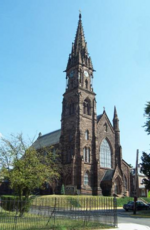The City of Orange is a township in Essex County, in the U.S. state of New Jersey. As of the 2020 United States census, the township's population was 34,447, an increase of 4,313 (+14.3%) from the 2010 census count of 30,134, which in turn reflected a decline of 2,734 (+8.3%) from the 32,868 counted in the 2000 census.The New Jersey Legislature originally incorporated Orange as a township on November 27, 1806, from parts of Newark Township. Parts of the township were taken on April 14, 1834, to form the now-defunct Clinton Township. On January 31, 1860, Orange was reincorporated as a town. Parts of the town were taken to form South Orange Township (April 1, 1861, now known as Maplewood), Fairmount (March 11, 1862, now part of West Orange), East Orange Township (March 4, 1863) and West Orange Township (April 10, 1863). On April 3, 1872, Orange was reincorporated as a city. In 1982, the city was one of four Essex County municipalities to pass a referendum to become a township, joining 11 municipalities that had already made the change, of what ultimately were more than a dozen Essex County municipalities to reclassify themselves as townships to take advantage of federal revenue sharing policies that allocated townships a greater share of government aid to municipalities on a per capita basis. The city derives its name from William III of England or William IV, Prince of Orange.Despite the differences in the municipalities' character, Orange, East Orange, South Orange and West Orange are sometimes jointly called The Oranges.In 2020, the township had New Jersey's 12th-highest property tax rate, with an equalized rate of 4.679% compared to 2.824% in the county as a whole and a statewide average of 2.279%.









